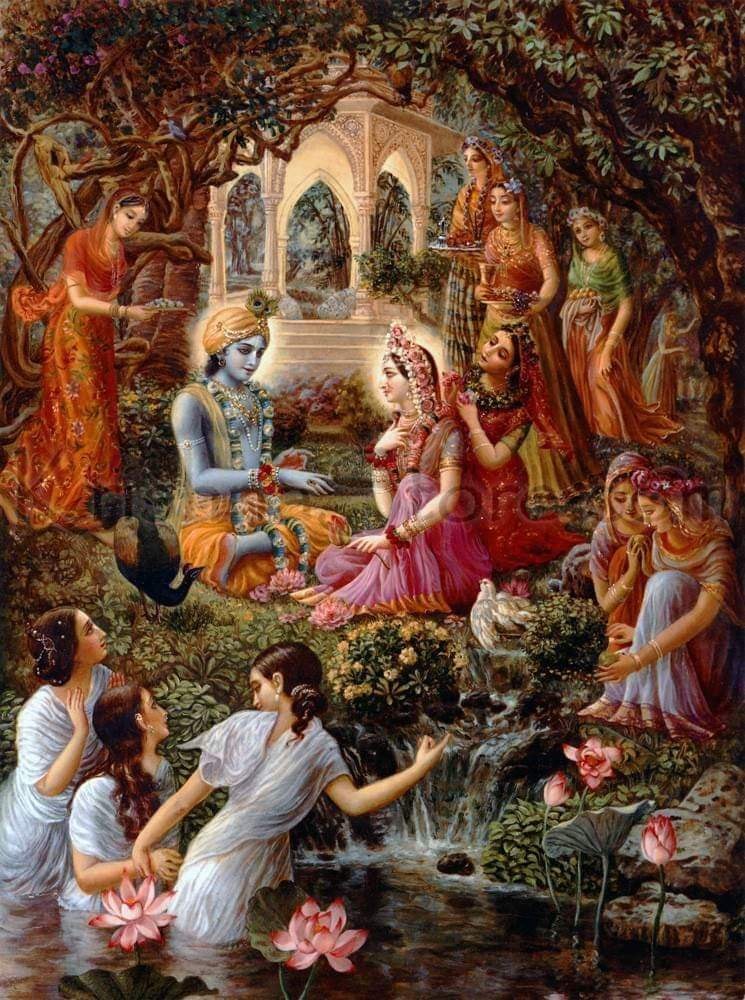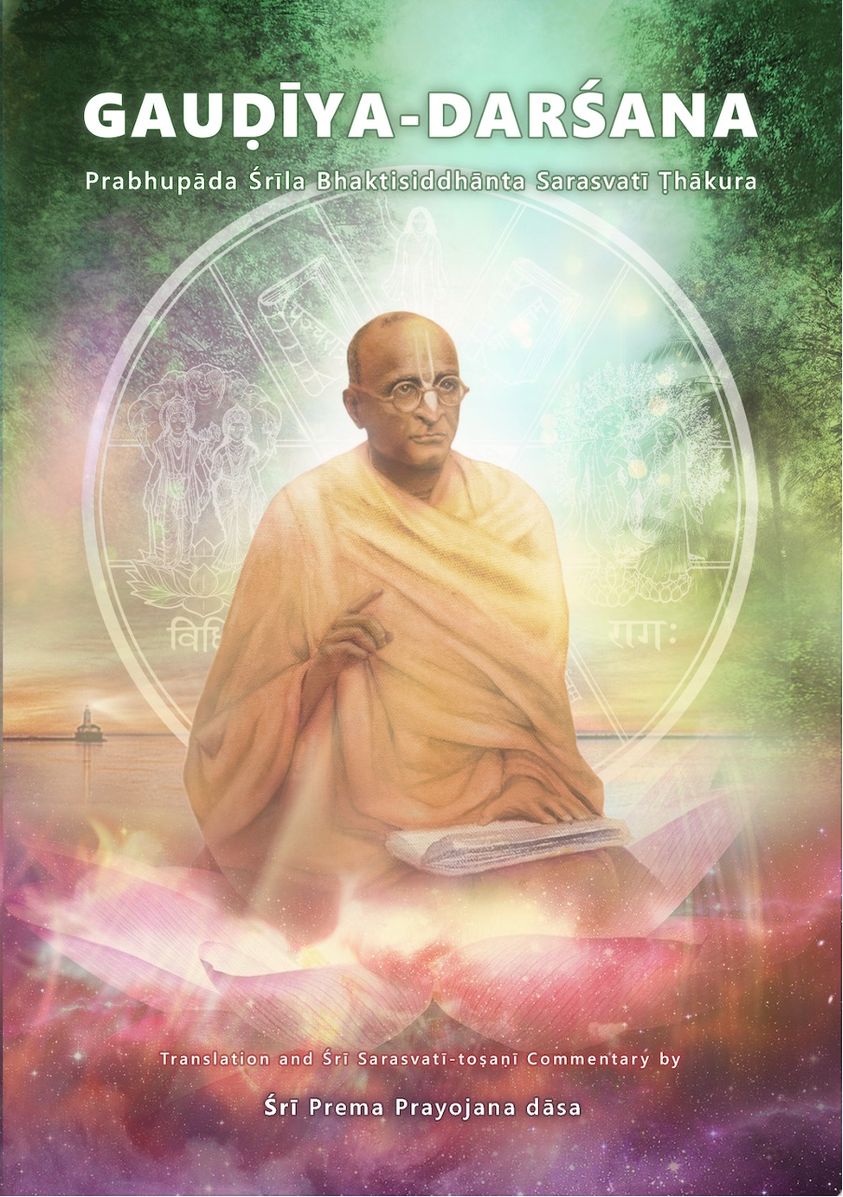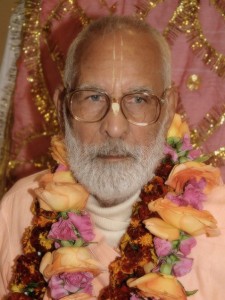
Srila Bhaktivedanta Narayana Maharaja
A Lecture by Tridandisvami Sri Srimad Bhaktivedanta Narayana Maharaja, Given in Holland June 28, 2002
Usually on his Western tours, Srila Narayana Maharaja spoke on a different theme in each country or city. During the 2002 summer tour, however, He discussed the same theme and the same verses of Raya Ramananda Samvad in two countries. Raya Ramananda Samvad is the conversation between Caitanya Mahaprabhu and His associate Raya Ramananda, regarding various conceptions of the ultimate goal of life. The following is a transcription of one of those lectures
Srila Narayana Maharaja: We begin today with:
brahma-bhutah prasannatma
na socati na kanksati
samah sarvesu bhutesu
mad-bhaktim labhate param
(Madhya lila 8.65)
Lord Caitanya Mahaprabhu and Sri Ramananda Ray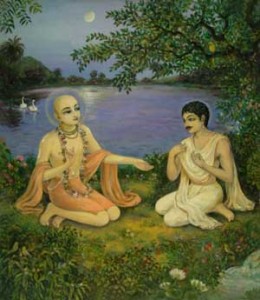
Ramananda Raya continued, "According to the Bhagavad-gita, 'One who is thus transcendentally situated at once realizes the Supreme Brahman and becomes fully joyful. He never laments or desires to have anything. He is equally disposed toward every living entity. In that state he attains pure devotional service unto me."
What are the symptoms of a person who is situated in the stage of brahma-bhutah? He is not affected by birth, or death, or by worldly sufferings. He is always happy because he never feels that he is in want of anything. We have desires, but one on the platform of brahma-bhutah doesn't have any worldly desires. Na kanksati. He never desires anything. Na socati. Even if all his possessions are destroyed, he never laments. Samah sarvesu bhutesu. He considers that all souls are brahma, spirit, not matter, and therefore all are equal. The atma is the same in the body of an elephant, a cow, a hog, or a dog, because all are brahma. Mad-bhaktim labhate param; if one does not offend any grantha (book) bhagavat, like Srimad Bhagavatam, or any bhakta bhagavata, a mahabhagavata Vaisnava, it may be that Krsna will arrange a high class of association for him. Then, under the guidance of such association, he will gradually attain para-bhakti, meaning prema-bhakti. Lord Caitanya The Golden Avatar
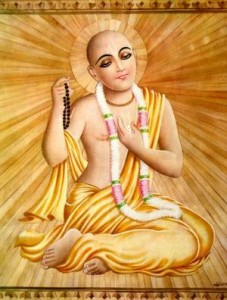
Their goal is mukti, but they like to read the sweet pastimes of Krsna and they chant, "Hare Krsna, Hare Krsna." This type of person, who lives in Vrndavana, or Puri Dhama, or elsewhere, who likes to hear and to explain the sweet pastimes of Krsna, will attain para-bhakti very quickly. There is a condition however. They can only achieve para-bhakti if they associate with pure devotees and if they follow the correct process. Radha And Krishna
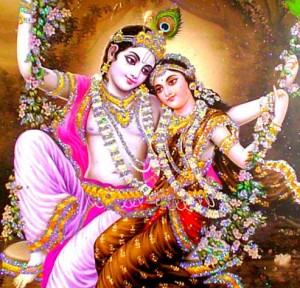
Rejecting this, Mahaprabhu said, "Eho bahya; this is also external." He said this because that conception is mixed with impersonal jnana. One desires salvation, to merge with Krsna, Paramatma, brahma, or the rays of brahma. This is not the pure religion of the atma, and therefore Caitanya Mahaprabhu told Raya Ramananda, "This is external; you should go on to something better. Then, "Raya kahe." Ramananda Raya replied, "Jnana-sunya bhakti sadhya-sara." Giving an example from the Brahma-vimohan-lila in the 10th Canto of Srimad Bhagavatam, Ramananda Raya quoted the prayer of Brahma after he had stolen Krsna's cows:
jnane prayasam udapasya namanta eva
jivanti san-mukharitam bhavadiya-vartam
sthane sthitah sruti-gatam tanu-van-manobhir
ye prayaso 'jita jito 'py asi tais tri-lokyami
(Madhya 8.68)
[Ramananda Raya continued, "Lord Brahma said, `My dear Lord, those devotees who have thrown away the impersonal conception of the Absolute Truth and have therefore abandoned discussing empiric philosophical truths, should hear from self-realized devotees about Your holy name, form, pastimes and qualities. They should completely follow the principles of devotional service and remain free from illicit sex, gambling, intoxication and animal slaughter. Surrendering themselves fully with body, words and mind, they can live in any asrama or social status. Indeed, You are conquered by such persons, although You are always unconquerable.'" Srila Bhaktivedanta Swami Prabhupada
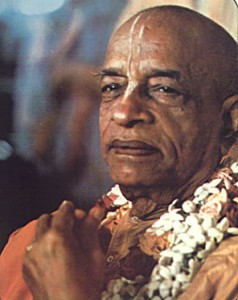
There are many kinds of jnana, like tat-padartha jnana (the knowledge regarding Krsna's bhagavata or Godhood), tvam-padartha jnana (the knowledge of the jiva's infinitesimal nature and his relationship with bhagavan), and jiva-brahma-aikya jnana (the misconception that the jiva and the supreme brahma are one inall respects), and they have been explained in great detail in sastra. Impersonal knowledge is not appreciated in Srimad Bhagavatam, and Srila Vyasadeva and Sri Sukadeva Gosvami have refuted impersonal jnana throughout Srimad Bhagavatam and other scriptures. What to speak of "tat-tvam asi" jnana and "aham brahmasmi" jnana, even the tattva-jnana that Krsna is the supreme Lord and the creator – not that He Himself creates, but that He gives the order to His subordinates and they then create anddestroy millions of universes in a moment – must ultimately be discarded. Jnane preyasam udapasya. Don't endeavor for that.
At first Srila Bhaktivedanta Swami Maharaja preached that Krsna is the Supreme Lord; but later, inspiring me, he said, "Now you should go everywhere and tell the devotees that Krsna is not the Supreme Lord – that He is merely the son of Nanda Baba and Mother Yasoda. Tell them that He is the most beloved of the gopis – only this." If you have knowledge that Krsna is the Supreme Lord, Vraja prema can never come – never, never, and never. It would be very absurd to think that both are simultaneously possible.
Although it is possible for Krsna, the conceptions of aisvarya and madhurya cannot exist simultaneously for devotees. When Krsna showed Arjuna His universal form on the battlefield during the Mahabharata war, Arjuna became perplexed and began to pray with folded hands, " I have made many mistakes. I have done wrong. I have called You 'sakha,' friend, and You are also personally driving my chariot. Prabhu, excuse me for this. Now I know that You are the creator of this universe. You are the Supreme Lord." Arjuna now forgot his friendship with Krsna, and he repented his previous actions and mentality. On the other hand, when Mother Yasoda saw the universal form in Krsna's mouth, she was puzzled and thought, "Why is my boy like this? A ghost may have come." Overwhelmed by vatsalya-prema, she called for the brahmanas and also for Nanda Baba. The brahmanas told her, "We will quickly purify Him." Then, after fetching black cows for a yajna, the brahmanas procured urine and cow dung, mixed them together, and applied it on the body of Krsna. Mother Yasoda and Krishna
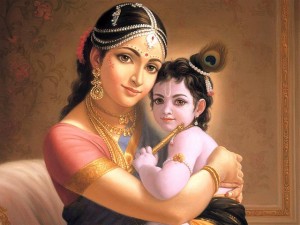
Jnane prayasam udapasya namanta eva. For those of you who are somewhat advanced, don't endeavor to practice in this way – to know that Krsna is the Supreme Lord. You should go to the assembly of pure Vaisnavas like Sri Sukadeva Gosvami, where hari-katha is flowing automatically, like a stream, or a fountain, or a waterfall.
tasmin mahan-mukharita madhubhic-caritra
piyusa-sesa-saritah paritah sravanti
ta ye pibanty avitrso nrpa gadha-karnais
tan na sprsanty asana-trd-bhaya-soka-mohah
(Srimad-Bhagavatam 4.29.40)
"My dear King, in the place where pure devotees live, following the rules and regulations and thus purely conscious and engaged with great eagerness in hearing and chanting the glories of the Supreme Personality of Godhead, in that place if one gets a chance to hear their constant flow of nectar, which is exactly like the waves of a river, one will forget the necessities of life – namely hunger and thirst – and become immune to all kinds of fear, lamentation and illusion." Radha And Krishna
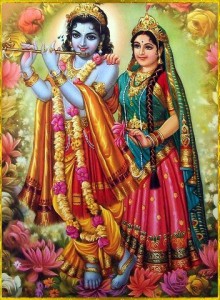
We have heard that Srila Bhaktisiddhanta Sarasvati Gosvami Thakura Prabhupada would explain sastra for hours and hours, And even a child like Madhumangala (the five-year-old son of Sripad Ramsraddha dasa who was present in Srila Maharaja's class) and other children would come to faithfully listen to his continuous discourses. Tasmin mahan mukharita. The sweet pastimes of Krsna flow automatically from the mouth of the pure devotee, just like a stream of honey. Even if no one in his audience has asked him questions, the flow of nectar still comes from his mouth.
Editorial advisors: Pujyapad Madhava Maharaja and Sripad
Brajanatha dasa
Transcriber: Ananga Manjari dasi
Editors: Premavati dasi and Syamarani dasi
Typist: Premavati dasi

 Posted in
Posted in 





